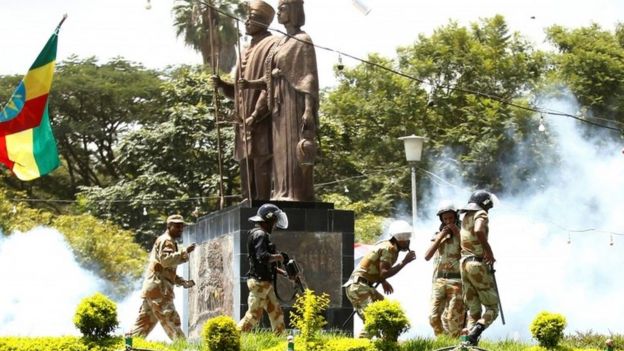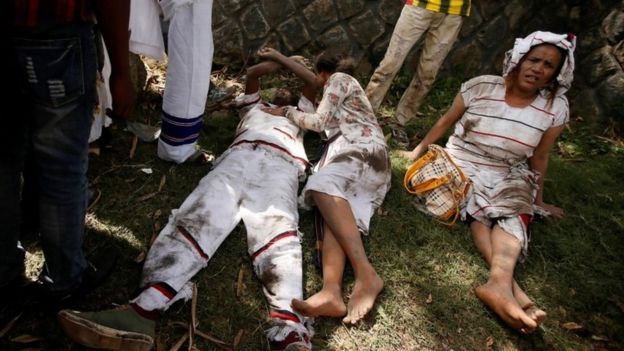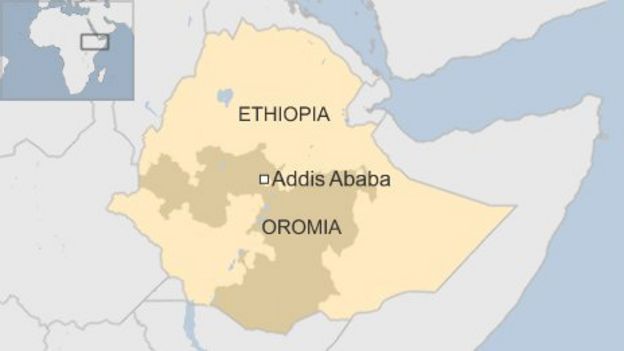ከስራ አምስት አመት በፊት ነው ኤዴፓ በቅሎ ቤት በሚገኘው ጽ/ቤቱ እለተ ግንቦት 20ን አስመልክቶ አንድ ፕሮግራም አዘጋጅቶ ተገኝተናል፡፡ ከተናጋሪዎቹ አንዱ የነበሩት የወቅቱ የፓርቲው ሊቀመንበር ዶ/ር አድማሱ ገበየሁ ባደረጉት ንግገር ውስጥ መፍራትና መጠንቅ ካለብን ሰንደቅ ዓላማ ለብሰው እኛኑ መስለውና ተመሳስለው ሀገር የሚያፈርሱትን በመካከላችን የሚገኙትን ነው የሚለው አረፍተ ነገር በአእምሮየ ተቀርጾ አብሮኝ ይኖራል ፡፡
ከሰፊው ኢትዮጵያዊ ማእድ ይልቅ በትንሽ ገበታ መብላት አስመኝቶአቸው ይህንኑ ያሳካልናል ባሉት መንገድ የሚደነቃቀፉትም ሆኑ ዛሬ እየሞተ ካለው ወገናቸው ሞት ይልቅ የዛሬ መቶ አመት ተፈጸመ የሚሉት በፈጠራ ድርሰት የተቀባባ በደል የሚያማቸውና በዛን ዘመን ተፈጸመ ለሚሉት ዛሬ ማንን አንደሚበቀሉ ባይታወቅም ለበቀል ያሰፈሰፉ፣ ለመለየት የሚጣደፉ ሌሎችም ሰበብ ምክንያት እየፈጠሩ ኢትዮጵዊነትን የሚያኮስሱና ከቻሉም ሊያጠፉ የሚከጅሉ ወያኔን ጨምሮ በንግግራቸውም በተግባራቸውም ይታወቃሉና ሀገር የማፍረስ አደጋቸው አምብዛም ነው፡፡
የእነዚህ አደጋ ሊከፋም ሊሰፋም የሚችለው ኢትዮጵያን የሚለው ወገን እነዚህን ወገኖች በደንብ ለይቶ አውቆና ተጠንቅቆ ተባብሮና ተጠናክሮ ህልማቸው እንዳይሳካ መስራት ካልቻለ ብቻ ነው፡፡ ከላይ የተጠቀሱት ቅዱስ አስተሳሰብ የራቃቸው ወጎኖች በቆጥር ትንሽ፣ ራእያቸው ጠባብ፣ ፍላጎታቸው ከራስ ጥቅም መሻት ያልዘለለና አንወክለዋለን የሚሉትን የህብረተሰብ ክፍል አንኳን የማያማክል በመሆኑ ኢትዮጵያን የሚለው ወገን ካልተዘናጋና እሱም ርስ በርሱ መስማማት ተስኖት ምቹ ሁኔታ ካልፈጠራለቸው በስተቀረ በምንም መልኩ ህልማቸው ሊሳካ ቀርቶ ስጋት ሊሆኑ አይችሉም፡፡
በወያኔ አብዮት ማግስት በተፈጠረ የፖለቲካ ስካር አሁን ከምንሰማቸው የባሱ ነገሮች በመንግሥት መገናኛ ብዙኃን ሳይቀር ሲነገሩ ሰምተናል፤ተጽፎ አንብበናል፡፡ ግና ስካሩ ሲበርድ እንኳን ንግግሩ ተናጋሪዎቹ በቦታቸው አልተገኙም፡፡ እናም አንድ ነገር በተከሰተ ቁጥር ፍላጎታቸው የሚሳካ የሚመስላቸው ቅዠታሞች በየመድረኩ ቅዠታቸውን ቢናገሩና መሰሎቻቸው ቢያጨበጭቡላቸው እነርሱንም ሆነ ተከታዮቻቸውን ይበልጥ አንድናውቃቸውና ቀይ መስመር ውስጥ አንድናስቀምጣቸው ይረዳናል አንጂ ስጋት ሊሆኑን አይችሉም፡፡ እንደውም አንዲህ አይነቶቹን ሌሎቹንም ሰዎች ይበልጥ አንዲታወቁ በየመድረኩ እየጋበዙ ማናገር ነው፡፡ አበው ሆድ ያባውን ብቅል ያወጣዋል እንዲሉ የፖለቲከኛ ሆድ ያባውን የሚያወጣው ጭብጨባ ነውና የውስጣቸውን አንድም ሳያስቀሩ አንዲናገሩ በጭብጨባ ማሰከር ነው፡፡ ከዛ በደንብ እናውቃቸዋለን ባወቅናቸው መጠንም አንጠነቀቃቸዋለን እንጠብቃቸዋለን ፡፡ ሰው የሚያስቸግረው ማንነቱና ምንነቱ እስኪታወቅ ነው ይባል የለ!
ይልቅ በንቃት መከታተል ቃል ከተግባር እየመዘንን መለየት ያለብን ዶ/ር አድማሱ ገበየሁ ከአስራ አምስት ዓመት በፊት አንደተናገሩት ሰንደቅ ዓላማ ለብሰው ሀገር ለማፍረስ ወስጥ ውስጡን የሚያደቡትን፡፡ እንደዚህ አይነቶቹ ሰዎች ወገኔ ተበደለ፣ ሀገሬ ተጠቃ፣ ብለው እንባ ለማንባት የሚገዳቸው አይደሉም፡፡ሰንደቅ ዓላማ ለብሶ ለመፎከር ወያኔን ጥንብ ርኩሱን እያወጡ ለመስደብ ወደር አይገኝላቸውም፡፡
ይህን አድራታቸውን እያየንና እየሰማን ከእነርሱ ወዲያ ሀገር ወዳድ ለአሳር ከእነርሱ በላይ ታጋይ ከየት ሊገኝ ወዘተ በማለት አድናቆታችንን እየገለጽን ከሆኑት አይደለም ፈጽሞ ሊሆኑት ከሚችሉት በላይ እያሞገስንና እያወደሰን እውነተኛ ማንነታቸውን ለመደበቅ ከሚለብሱት ሰንደቅ ዓላማ በላይ ከፍተኛ ሽፋን አንሰጣቸዋለን፡፡እናም ሳናውቅ እየተከተልናቸው ብቻ ሳይሆን እየደገፍናቸው ሀገር ለማፍረሰ ይህም ባይሆን የኢትዮጵያ ህዝብ ከአገዛዝ አንዳይላቀቅ ለሚፈጽሙት ድብቅ ዓላማቸው አባሪ ተባባሪ ስንሆን ኖረናል፣ አሁንም እንደዛው ያሉ ብዙዎች ይኖራሉ፡፡
እስቲ ዛሬ በዚህ ወሳኝ ወቅት ሳንደባበቅ ደፈር ብለን ለመነጋገር እንሞክር፡፡ ሰንደቅ ዓላማ ለብሶ የሚፎክረው፣ በወያኔ ላይ የውግዘት የቃላት ናዳ የሚያወርደው፣ ወያኔ ዜጎችን በገደለ ቁጥር ያዙኝ ልቀቁኝ የሚለው ወዘተ ሁሉ በርግጥ ለሀገር ነጻነትና ለዴሞክራሲያዊ ሥርዓት ግንባታ የሚታገል ቢሆን ኖሮ፤ ዛሬ በምንገኝበት ሁኔታና ደረጃ እንገኘ ነበር፡፡
በእውነት ሰንደቅ ኣላማ ለብሶ ኢትዮጵያዊነትን የሚዘምረው ሁሉ ሀያ አምት ዓመታት በህዝብ ላይ የተፈጸመው ይቅርና በዚህ አንድ መት የተፈጸመው ግድያ እስራትና ማሰቃየት የሚያመው ቢሆን ኖሮ ተቀዋሚዎች አሁን በዚህ ወቅት በሚገኙበት ደረጃ ላይ መገኘት ነበረባቸው፡፡
ሰንድቅ ዓላማ ለብሰው የምናያቸው ፖለቲከኞች በቃላት እየደለሉ በተግባር ግን ከሚናገሩት ተቃራኒ ዓላማ የሚያራምዱ ካልሆኑ በአደባባይ ለሚናገሩት ለአንዲት ኢትዮጵያ ነጻነትና ሁሉንም በእኩልነት የሚያስተዳድር ዴሞክራሲያዊ ሥርዓት ለመመስረት ይህን ያህል ፓርቲ/ድርጅት ያስፈልግ ነበር፡፡ በአንድ ብሄር ስም ሶስት አራት ድርጅት፣ ተመሳሳይ ሀገራዊ ፕሮግራም ጽፎ በሰዎች ምክንያት ሶስት አራት ፓርቲ መመስረት ይገባ ነበረ፣ ይህን አድርገው ደግሞ መልሰው የእኛ አንድ አለመሆን ነው የወያኔን እድሜ ያራዘመው በማለት ያደነቁሩናል፡፡ በዚህም ፕሮፓጋንዳ ራሳቸውን ተባብሮ የመስራት ፈላጊ አድርገው በሌሎች ላይ ጣት ለመቀሰር ቅድሚያውን የሚወስዱትና በድፍረት የሚናገሩት እነዚሁ በዶ/ር አድማሱ ገለጻ ሰንደቅ ኣላማ ለብሰው ሀገር የሚያፈርሱ የተባሉቱ ናቸው፡፡
ያላችሁት በዝታችኋል፣ በተናጠልም መጠናከር ተስኖአችኋል የምትነግሩን የምታምኑበትን ከሆነ ኮከባችሁ የሚገጥም እየተመራረጣችሁ ተባበሩ ተብሎ ልመናም ጫናም ተደርጎ ህብረት ፈጠርን ቅንጅት መሰረትን ይሉና የዚህም መሪ ተዋናይ እነርሱ አንደሆኑ አድርገው ከተግባሩ ፕሮፓጋንዳውን አግዝፈው ይነግሩንና ውለው ሳያድሩ ወደ እምነታቸው ተመልሰው የተገናኘውን ሲያላያዩ የተባበረውን ሲፈርሱ ይገኛሉ፡፡እነርሱ ያልገቡበት ህብረት ከተፈጠረም ከዳር ሆነው ውግዘታቸው ትችታቸው ሲብስም ውንጀላቸው አያድርስ ነው፡፡ ደጋፊዎቻቸውም የሚነገራቸውን ለማስማት አንጂ የሚሰራውን ለማየት አይናቸውን አይገልጡምና እገሌን ያላከተተ ህብረት አነ እገሌ የሌሉበት ቅንጅት ወዘተ በማለት መሪዎቻቸውን ተከትለው የቃላት አረራቸውን ይተኩሳሉ፡፡ ተረዳድተውም ለማደናቀፍ ይሰራሉ፡፡
በአንድ በኩል ብዙዎችን ወደ ጥቂቶች ለመቀነስ ሲደከም በሌላ በኩል ደግሞ አንዳንዶች አንድ ፓርቲ የነበሩት አንደ አሜባ ራሳቸውን እያባዙ አንዳንዶች ደግሞ እኛስ ከማን እናንሳለን በሚል ስሜት በሚመስል አዲስ ፓርቲ እየፈጠሩ ልዩነቱን ያሰፉታል ችግሩን ያባብሱታል፡፡ ትግሉ ወደ ፊት ከወያኔ ጋር መሆኑ ይቀርና ሰበብ ምክንያት እየተፈጠረ የጎንዮሽ ይሆናል፡፡
ወያኔ ተንገዳግዶ ላለመውደቅ የመጨረሻ አማራጭ ያለውን የአስቸኳይ ግዜ አዋጅ ባወጀበት በዚህ ወቅት በተቃውሞ ጎራ የተሰለፉት ወገኖች ሁሉም ለሀገር ነጻነትና ለዴሞክራሲዊ ሥርዓት ከሆነ ትግላቸው ወያኔ ከተንገዳገደበት መልሶ እንዳይቃና እነርሱም ትግላቸውን ማቀናጀት ካልሆነም የጎንዮሹን ትግል ማቆም የሚያስችል ለስድስት ወራት የሚቆይ የአስቸኳይ ግዜ አዋጅ/ስምምነት ማውጣት በቻሉ ነበር፡፡ ግን ሰንደቅ ዓላማ ለብሰው ሀገር ለማፍረስ የሚሰሩ፣የነጻነት ታጋይ መስለው ለወያኔ እድሜ መርዘም የሚጥሩ፣የዴሞክራሲ ናፋቂ መስለው ከራስ በላይ የማያስቡ አሉና በሺዎች የሚቆጠሩ ወገኖቻቸንን ሞት በየመድረኩ እየደሰኮሩ እነርሱ ግን ከነበሩበት አንድ ርምጃ ወደ ፊት መራመድ አልቻሉም፡፡
ኢትዮጵውያን ከወያኔ አገዛዝ እንዳንላቀቅ የሚያደርጉን ከዚህም አልፎ እኔ ከሌለሁ ኢትዮጵያ ትበታተናለች የሚለው የወያኔ ማስፈራሪያ እውን የመሆን አጋጣሚ እንዲያገኝ የሚሰሩ፣ ኢትዮጵያ ትበታተን ብለው በአደባባይ የሚነግሩን ሳይሆኑ ሰንደቅ ዓላማ ለብሰው ሳይታወቅና ሳይነቃባቸው ሀገር የማፍረስ ተግባር ላይ የተሰማሩት ናቸው፡፡ ስለሆነም ከፍሬያቸው ታውቁዋቸዋላችሁ ተብሎ አንደተጻፈው ሰንደቅ ዓላማ ለብሰው በመታየታቸው ወይንም በማራኪ ቃላቶቻቸውና በአዞ እንባቸው ሳንታለል በተግባራቸው እንመዝናቸው አንለያቸው አንወቃቸው፡፡ ሳናውቃቸው የእኩይ ተግባራቸው ተባባሪ በመሆን ከኋላ ጸጸትና የአብሮ ተጠያቂነት ለመዳን መፍራትም መጠንቀቅም ያለብን በአደባባይ ወጥተው ቅዠታቸውን የሚነግሩንን ሳይሆን ሰንደቅ ዓላማ ለብሰው ከእነርሱ በላይ ሀገር ወዳድ ታጋይ የሚባልላቸውን ነው፡፡









